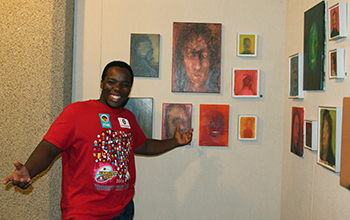Latest News Archive
Please select Category, Year, and then Month to display items
19 November 2018
|
Story Charlene Stanley
|
Photo Charlene Stanley
 Prof John Mubangizi, Dean of the Faculty of Law, encouraged delegates at the Fifth Annual International Mercantile Conference to share ideas on best international practice in their various fields.
Prof John Mubangizi, Dean of the Faculty of Law, encouraged delegates at the Fifth Annual International Mercantile Conference to share ideas on best international practice in their various fields.
“Don’t say anything online that you wouldn’t want plastered on a billboard with your face on it.”
This famous quote by international tech expert Erin Bury should be a guiding light when it comes to online habits in the workplace, according to Francois Cilliers, UFS Lecturer in Mercantile Law.
In his presentation Could Social Media be the Gateway to Employment Discrimination? he warned that employees have a responsibility not to bring their employers in disrepute through their comments on social media.
“Posts, updates, tweets, and comments are considered to be publications and can therefore never be seen as privileged information,” he explained.
Responsibility on employees and employers alike
He pointed out that employers also had a responsibility regarding the way in which they use the information about prospective employees obtained via social media.
“Nowadays, approximately 75% of companies hire through social media. In the US, recruiting companies spend hours researching candidates, making full use of what they can find on social media. It was found that 50–80% of employers frowned upon posts and pictures featuring drug and alcohol abuse, profanity, and bad grammar.”
He warned that employers needed to tread lightly, as a decision not to employ someone as a result of information on the prospective employee’s political views and sexual orientation could constitute unfair discrimination as set out in the Employment Equity Act.
“An employer who wishes to use a screening process (utilising social media) has to prove that the information and the process is objectively necessary and can be justified with reference to the inherent requirements of the job,” he explained.
“As technology and electronic systems advance, so too should the applicable labour laws.”
Cilliers’ presentation formed part of the Fifth Annual International Mercantile Law Conference recently hosted by the Faculty of Law on the Bloemfontein Campus.
Incorporating new technology in teaching and research
“This conference is an opportunity to share ideas on best practice in what is perceived as a ‘difficult’ field within Law,” said Prof John Mubangizi, Dean of the Faculty of Law, as he opened the proceedings. Topics in the discussion sessions ranged from Racism in the workplace and The underrepresentation of females in the judiciary, to Decriminalisation of cannabis: A recipe for healthy employer-employee relations?
“Conferences such as these help us to take advantage of the newest developments in technology to advance our teaching and research,” said Prof Mubangizi.
“To quote Einstein: ‘We can’t solve problems by using the same kind of thinking we used when we created them.’”
Pauline Gutter’s metaphorical representations of South Africa
2016-04-07

Art student, Thamsanqa Malgas views the Purgatorium exhibition at the Stegmann Gallery on the Bloemfontein Campus (UFS).
Photo: Rethabile Isaacs
|
Purgatory is a temporary condition of torment or suffering. This is the central thread of the renowned artist’s exhibition, Purgatorium, at the University of the Free State (UFS). Pauline Gutter’s exhibition was opened by Harry Siertsema on 9 March 2016 at the Stegmann Gallery on the Bloemfontein Campus.
The artist, who grew up on a farm in the Free State, is influenced by animals and farm life. “My work is on many levels a metaphorical representation of the violence of current South Africa. Some people want to move away from stigma, others adopt hysteria. The impressive yet vulnerable bulk of the bulls depicted in uncomfortable positions manifests the voiceless and powerless generation of food producers in their daily struggles for survival,” she wrote in the catalogue of the exhibition.
Prof Dirk van den Berg of the UFS Department of History of Art and Image Studies wrote an essay about the exhibition, in which he captures the lived endurance of stress and suffering which Pauline Gutter depicts vividly in Purgatorium.
“The paintings, drawings, and prints in this exhibition have, in various ways, the effect of disseminating the basic tenor of the weaning metaphor of struggle for survival into the farming domains of the land, its creatures, and its people,” said Prof van den Berg.
Art student, Thamsanqa Malgas, was very impressed with the exhibition, saying that it was a fascinating collection, and a must-see for art lovers. The exhibition closed on 1 April 2016.